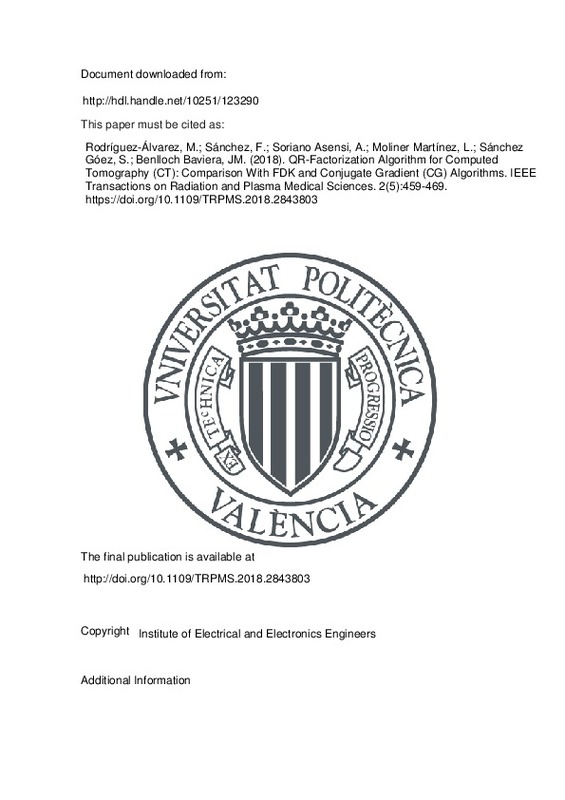JavaScript is disabled for your browser. Some features of this site may not work without it.
Buscar en RiuNet
Listar
Mi cuenta
Estadísticas
Ayuda RiuNet
Admin. UPV
QR-Factorization Algorithm for Computed Tomography (CT): Comparison With FDK and Conjugate Gradient (CG) Algorithms
Mostrar el registro sencillo del ítem
Ficheros en el ítem
| dc.contributor.author | Rodríguez-Álvarez, MJ
|
es_ES |
| dc.contributor.author | Sánchez, F.
|
es_ES |
| dc.contributor.author | Soriano Asensi, Antonio
|
es_ES |
| dc.contributor.author | Moliner Martínez, Laura
|
es_ES |
| dc.contributor.author | Sánchez Góez, Sebastián
|
es_ES |
| dc.contributor.author | Benlloch Baviera, Jose María
|
es_ES |
| dc.date.accessioned | 2019-07-07T20:03:22Z | |
| dc.date.available | 2019-07-07T20:03:22Z | |
| dc.date.issued | 2018 | es_ES |
| dc.identifier.issn | 2469-7311 | es_ES |
| dc.identifier.uri | http://hdl.handle.net/10251/123290 | |
| dc.description.abstract | [EN] Even though QR-factorization of the system matrix for tomographic devices has been already used for medical imaging, to date, no satisfactory solution has been found for solving large linear systems, such as those used in computed tomography (CT) (in the order of 106 equations). In CT, the Feldkamp, Davis, and Kress back projection algorithm (FDK) and iterative methods like conjugate gradient (CG) are the standard methods used for image reconstruction. As the image reconstruction problem can be modeled by a large linear system of equations, QR-factorization of the system matrix could be used to solve this system. Current advances in computer science enable the use of direct methods for solving such a large linear system. The QR-factorization is a numerically stable direct method for solving linear systems of equations, which is beginning to emerge as an alternative to traditional methods, bringing together the best from traditional methods. QR-factorization was chosen because the core of the algorithm, from the computational cost point of view, is precalculated and stored only once for a given CT system, and from then on, each image reconstruction only involves a backward substitution process and the product of a vector by a matrix. Image quality assessment was performed comparing contrast to noise ratio and noise power spectrum; performances regarding sharpness were evaluated by the reconstruction of small structures using data measured from a small animal 3-D CT. Comparisons of QR-factorization with FDK and CG methods show that QR-factorization is able to reconstruct more detailed images for a fixed voxel size. | es_ES |
| dc.description.sponsorship | This work was supported by the Spanish Government under Grant TEC2016-79884-C2 and Grant RTC-2016-5186-1. | es_ES |
| dc.language | Inglés | es_ES |
| dc.publisher | Institute of Electrical and Electronics Engineers | es_ES |
| dc.relation.ispartof | IEEE Transactions on Radiation and Plasma Medical Sciences | es_ES |
| dc.rights | Reserva de todos los derechos | es_ES |
| dc.subject | 3-D images reconstruction | es_ES |
| dc.subject | Computed tomography (CT) | es_ES |
| dc.subject | Conjugate gradient (CG) | es_ES |
| dc.subject | Feldkamp | es_ES |
| dc.subject | Davis, and Kress (FDK) | es_ES |
| dc.subject | Medical imaging | es_ES |
| dc.subject | QR-factorization algorithm | es_ES |
| dc.subject | Reconstruction algorithms | es_ES |
| dc.subject | Reconstruction toolkit (RTK) | es_ES |
| dc.subject.classification | MATEMATICA APLICADA | es_ES |
| dc.title | QR-Factorization Algorithm for Computed Tomography (CT): Comparison With FDK and Conjugate Gradient (CG) Algorithms | es_ES |
| dc.type | Artículo | es_ES |
| dc.identifier.doi | 10.1109/TRPMS.2018.2843803 | es_ES |
| dc.relation.projectID | info:eu-repo/grantAgreement/MINECO//TEC2016-79884-C2-1-R/ES/DESARROLLO DEL HARDWARE PARA SISTEMA DE DIAGNOSTICO POR IMAGEN MOLECULAR PARA CORAZON EN CONDICIONES DE ESTRES/ | es_ES |
| dc.relation.projectID | info:eu-repo/grantAgreement/MINECO//RTC-2016-5186-1/ES/Control objetivo del deterioro cognitivo mediante análisis de imagen de amiloide/ | es_ES |
| dc.rights.accessRights | Abierto | es_ES |
| dc.contributor.affiliation | Universitat Politècnica de València. Instituto Universitario Mixto de Biología Molecular y Celular de Plantas - Institut Universitari Mixt de Biologia Molecular i Cel·lular de Plantes | es_ES |
| dc.contributor.affiliation | Universitat Politècnica de València. Departamento de Matemática Aplicada - Departament de Matemàtica Aplicada | es_ES |
| dc.contributor.affiliation | Universitat Politècnica de València. Instituto de Instrumentación para Imagen Molecular - Institut d'Instrumentació per a Imatge Molecular | es_ES |
| dc.description.bibliographicCitation | Rodríguez-Álvarez, M.; Sánchez, F.; Soriano Asensi, A.; Moliner Martínez, L.; Sánchez Góez, S.; Benlloch Baviera, JM. (2018). QR-Factorization Algorithm for Computed Tomography (CT): Comparison With FDK and Conjugate Gradient (CG) Algorithms. IEEE Transactions on Radiation and Plasma Medical Sciences. 2(5):459-469. https://doi.org/10.1109/TRPMS.2018.2843803 | es_ES |
| dc.description.accrualMethod | S | es_ES |
| dc.relation.publisherversion | http://doi.org/10.1109/TRPMS.2018.2843803 | es_ES |
| dc.description.upvformatpinicio | 459 | es_ES |
| dc.description.upvformatpfin | 469 | es_ES |
| dc.type.version | info:eu-repo/semantics/publishedVersion | es_ES |
| dc.description.volume | 2 | es_ES |
| dc.description.issue | 5 | es_ES |
| dc.relation.pasarela | S\376719 | es_ES |
| dc.contributor.funder | Agencia Estatal de Investigación | es_ES |
| dc.contributor.funder | Ministerio de Economía y Competitividad | es_ES |







![[Cerrado]](/themes/UPV/images/candado.png)

